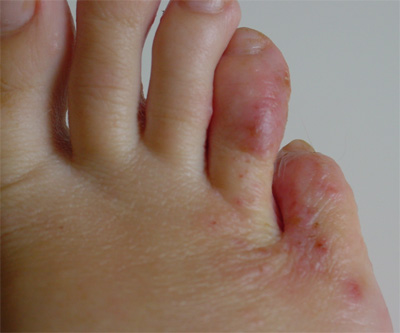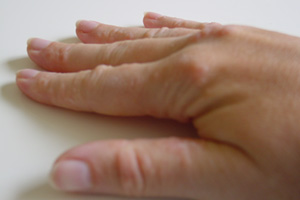Psoriasis Skin Condition

Psoriasis
Psoriasis is a chronic, non-contagious skin condition, which causes red scaly patches on the skin, these patches are most common on the knees, elbows and scalp but they can occur in other areas. The skin that is affected by psoriasis often grows much quicker than the unaffected skin and some people will find that the patches are itchy and the scales of skin shed. Psoriasis cannot be cured but with treatment the disease can be controlled. Approximately 3.8% of the population suffer from Psoriasis.
Psoriasis is common in both the sexes and normally appears from 15 to 25 years of age although there is a condition of Psoriasis, which is found mostly in children.
There are six different types of psoriasis:
Plaque Psoriasis: which is the most common form
Guttate Psoriasis: found mostly in children
Flexural Psoriasis: affects the folds of the body as well as the genital area
Erythrodermic Psoriasis: is quite a severe form that may require hospitalisation
Napkin Psoriasis
Pustular Psoriasis: is a more severe form of psoriasis that can become painful.
The mild form of Psoriasis often affects less than three percent of the body and a moderate condition of Psoriasis affects between three and ten percent of the body. . There is evidence to prove that Psoriasis can cause arthritis although it is unknown why, the condition is called Psoriasis Arthritis and the symptoms can include discomfort swelling, joint tenderness and inflammation in the joints, which causes pain. Ten to fifteen percent of Psoriasis suffers have Psoriasis Arthritis. The joints that are most likely to be affected are the last joint in the fingers or the toe, the lower back, wrists, knees and ankles.
There is evidence to prove that Psoriasis can cause arthritis although it is unknown why, the condition is called Psoriasis Arthritis and the symptoms can include discomfort swelling, joint tenderness and inflammation in the joints, which causes pain. Ten to fifteen percent of Psoriasis suffers have Psoriasis Arthritis. The joints that are most likely to be affected are the last joint in the fingers or the toe, the lower back, wrists, knees and ankles.
Fingernails and toenails can be frequently affected; this is called psoriatic nail dystrophy. Inflammation is seen under the nails and around the nails.
The cause of Psoriasis is unknown and not fully understood although there is tendency for the condition to be inherited as evidence shows it runs in families. There is a genetic component which triggers the immune system to produce an excessive number of skin cells.
Shock, infections and stress can trigger attacks of Psoriasis as well as an accident; bacterial or viral infections and fungal skin can make the Psoriasis appear. Certain medications and bites, cuts and abrasions can also cause Psoriasis to fire up. Also it is believed that other factors of Psoriasis can be excessive alcohol consumption and smoking. Creams and medicines can relieve the symptoms. Medications such as Cortisone, Methotrexate and Calcipotriol are used as well as Phototherapy (PUVA) and Ultraviolet light.
It is important that someone with Psoriasis moisturises as dry skin can lead to scratching. It is also suggested that a soap substitute is used and protective gloves are worn, especially when washing the dishes or working with soap powders. Fingernails and toenails should be kept short to prevent damage in regards to scratching.
The itchiness and pain involved with Psoriasis can drastically decrease the quality of life in regards to physical discomfort, inability to sleep and decreased ability in regards to activities. It also can be particularly embarrassing for an individual because of the flaky plaque causing the patient to feel self-conscious, which is Psoriasis can lead to depression and social isolation. In a 2008 study by the National Psoriasis Foundation it was found that seventy one percent of those surveyed though the disease was a significant problem daily. Sixty three percent felt self-conscious about their disease.
Psoriasis is different to eczema because it is more likely to be found on the extensor aspect of the joint.
MORE
- Chiropractic Myths & Truths
- Gerard Fogarty Arthritis and Knee Replacement...
- Kym Ellery The ELLERY Eyewear Collection Interview
- Dr Ross Walker The Real Modern Killers Interview
- Shelly Horton Hay Fever Help Interview
- Sebastian VanVeenendaal Royal Rehab's Beach...
- Abigail Koch Family Private Health Insurance...
- Monique Cashion Organic Awareness Month Interview
- Dr Bill Harris Omega-3s Interview
- The Top Ten Health Myths Busted
- Professor Bolin IBD Management a Life-Long...
- Anthia Koullouros Best Cold and Flu Defence...
- Leprosy in NSW
- Julie-Anne Mitchell Go Red for Women Healthy...
- Insight into Chronic Disease Hospitalisations...
- Jeff Chan Mobile Phone Allergies Interview
- How to Conquer Bad Winter Health Habits
- Bad Cholesterol Behind Cancer Spreading In Body
- New Screening Test Recommended To Help Prevent...
- Support For The Rural Nurse Workforce A...
- Kathy Nielsen Ovarian Cancer Australia National...



